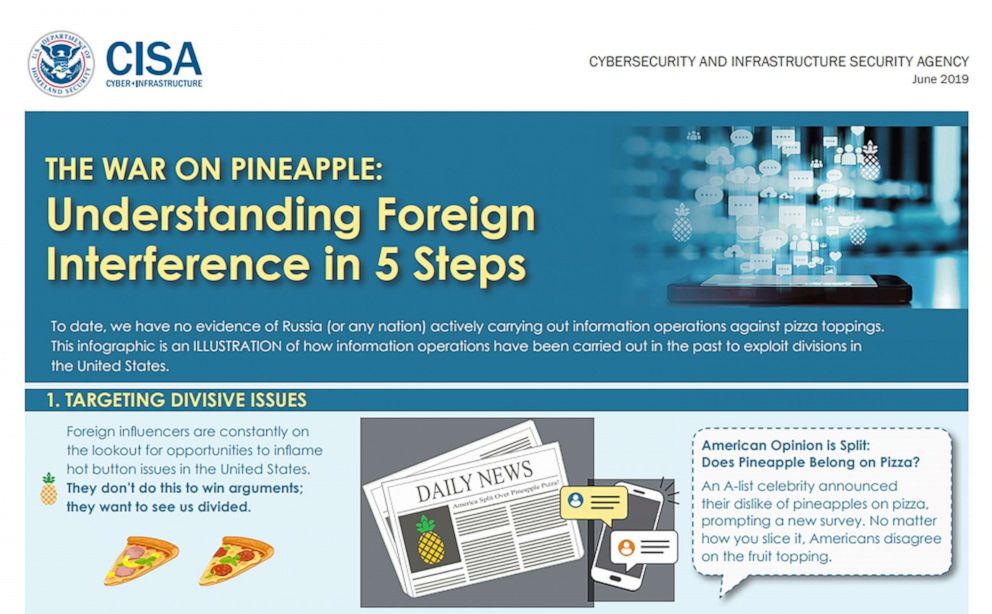DHS warns of Russian efforts to divide America over pineapple pizza -- sort of
The U.S. Department of Homeland Security (DHS) is warning that Russian agents could seek to further divide Americans by exploiting U.S. passions over whether pineapple belongs on pizza.
It's a cheesy, playful warning -- but it's trying to deliver a serious message. Posted online Wednesday by the department's Cybersecurity and Infrastructure Security Agency, the tongue-in-cheek warning aims to help Americans identify and protect against propaganda campaigns from Russia and other foreign adversaries.
After all, the DHS warning says, Russian agents are capable of simultaneously insisting online that "Being anti-pineapple is un-American!" while also pushing out posts saying "Millennials are ruining pizza!"
"Foreign influencers are constantly on the lookout for opportunities to inflame hot button issues in the United States," the new DHS warning says. "They don’t do this to win arguments; they want to see us divided."
According to the warning, foreign interference usually follows certain patterns.
First, foreign agents identify a divisive issue to target -- though likely not an issue as silly as whether pineapple is an appropriate pizza topping.
"No matter how you slice it, Americans disagree on the fruit topping," the DHS document notes with a pun.

After targeting a controversial issue, foreign agents then make sure social media accounts are in place, often reusing or renaming accounts "to pollute those debates with bad information and make our positions more extreme by picking fights, or 'trolling' people online," according to the DHS warning.
The "most extreme version of arguments on both sides of an issue" often then become framed "as legitimate information sources," pushing them "into the mainstream" and carrying them to larger audiences, the DHS warning says.
The final step of foreign interference is for agents to take what started in cyberspace and turn it into something "very real, with Americans shouting down Americans because of foreign interference," DHS warns.
"In the past, Kremlin agents have organized or funded protests to further stoke divisions among Americans. They create event pages and ask followers to come out," according to DHS.
DHS offered this example: If the "war on pineapple" was a more serious issue, a foreign agent might tell unwitting followers to "JOIN YOUR FELLOW PIZZA LOVERS AT THE TOWN CENTER TO MARCH FOR PINEAPPLE!"
Nevertheless, in its warning on Wednesday, DHS made clear -- in jest -- that: "To date, we have no evidence of Russia (or any nation) actively carrying out information operations against pizza toppings."
Russia's wide-ranging interference in the 2016 presidential campaign, from stealing and releasing thousands of Democratic National Committee emails to waging disinformation campaigns online, has U.S. authorities bracing for what could happen in the run-up to the 2020 presidential election.
Russian President Vladimir Putin not only wants to "weaken" the United States in the years ahead, but he also wants to keep his grip on power, according to Suzanne Spaulding, a former senior official at DHS who helped lead U.S. efforts to mitigate Russian cyber operations.
"He doesn't want [Russian citizens] to see ... the United States and liberal democracy as something they should long for. So what he wants to portray to them is democracy in chaos," Spaulding said Friday at the annual Aspen Security Forum in Aspen, Colorado.
And when it comes to cyber-operations against foreign adversaries, Russia "is practicing jiu jitsu," trying to use the First Amendment and American free speech "against us," Spaulding said.
A DHS spokeswoman did not immediately respond to a request seeking comment for this article.




